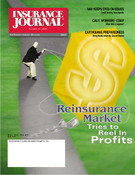As the 2003 legislative season dawns, insurance scoring is the lead issue for the National Association of Independent Insurers (NAII). Insurance coverage for mold is also a major concern in selected areas of the country, especially in California, Texas and Florida. Privacy remains a hot topic among states that have not yet adopted statutes or regulations to implement the Gramm-Leach-Bliley Financial Services Modernization Act (GLB), notably in California where NAII expects the legislature to resurrect a bill that the insurer group regards as onerous.
During this legislative session Sam Sorich, NAII vice president and western regional manager, expects half the state legislatures to consider legislation that would restrict insurers’ use of credit information.
NAII does not oppose regulating the use of credit information for rating and underwriting insurance coverage, he explained, but the association does not want to see state legislators throw out the baby with the bathwater. “As an association we are amenable to proposals that would restrict or modify insurers’ use of credit of information,” Sorich said. “We think some of the proposals that have been offered are acceptable. They do not significantly impede insurers’ use of credit information, and at the same time provide good consumer protection. On the other hand, we’re very concerned about proposals that go too far and hurt efforts to make insurance rates based on what we know is the true risk of loss.” The two provisions of most concern to insurers are restrictions on the use of credit information in making renewal decisions and proposed exemptions for “special circumstances.”
NAII argues that it does not make sense to accept the premise that credit information is a valid predictor of loss for new business but not for renewals. “If this is a valid predictor of loss,” Sorich argues, “we feel that it should be a valid predictor of loss at both the initial stage and at the renewal stage.”
Proposals in several states would also restrict insurers’ ability to use credit information in the underwriting process when the policyholder faces special circumstances, such as temporary unemployment, medical problems, divorce and lack of credit history. Although he acknowledges problems with using data in these situations, Sorich believes that the answer lies in better refining of the data rather than in legislative restrictions on its use.
Modernizing state regulation of the business of insurance is another of NAII’s national priorities. The association is looking for meaningful change in states where NAII regards regulatory regimes as out of step with the times. Sorich perceives improving the quality of state regulation as important to preserving the states’ right to regulate insurance and keeping the federal government out. “As an association we support state regulation,” he explained. “However, we are concerned with some of the state regulatory practices, concerned that many states don’t seem to operating in a modern, efficient manner. That concerns us because it opens the door to folks who are advocating a shift from the state to federal government.”
The three primary areas where NAII would like to see reform and modernization are regulation of rates and forms, market conduct, and licensing of agents and insurers. The association is advocating a move to reliance on competition as the principal market regulator, a position that the federal government has been advocating for more than 25 years.
Regulatory modernization will be especially important in Texas, according to Donald Hanson, southwest regional manager for NAII, and the legislature may be headed where NAII would prefer it not go. He pointed out that in Texas, the Lloyd’s marketplace and county mutuals have so far enjoyed freedom from rate regulation, but that the legislature may take a close look at changing that situation. “Pretty clearly one of the very top issues that the Texas legislature will consider in 2003 will be rate regulation of the Lloyd’s marketplace, where about 95 percent of all Texas homeowners coverage is currently written,” he said. “Probably the number one issue that the legislature will look at is what types of reform they may desire to place on that marketplace.”
Among local and regional issues, coverage for mold remains important but Sorich expressed the opinion that the drive to restrict the use of mold exclusions has lost some of its steam. He identified current market conditions and a growing public understanding of the problem that insurers are facing as the main drivers of the shift in public attitudes. “I sense that the issue has calmed down a bit,” he said. “There’s been a greater understanding of what insurance companies are doing and why they’re doing it.”
Coverage for mold, nevertheless, remains an important issue, especially in California, Texas and Florida. During the last legislative session a bill that would have barred the use of mold exclusions by insurers passed the California senate but failed to carry the assembly. Sorich expects the same measure or an essentially similar bill to come before the legislature this year.
The Texas Department of Insurance may have put the mold issue to rest, Hanson reported, by removing the very generous water damage provisions from Texas forms and relocating them to an optional endorsement. The concern now is that regulation of forms in Texas may create a breeding ground for another market disruption of similar magnitude. Texas statutes, he pointed out, allow the insurance department to approve additional forms only for national insurers. Hanson asserted that all insurers in the state need the same flexibility in their forms. “It’s important that broader forms flexibility is provided to all insurance companies in Texas, not just national companies,” he said. “If companies aren’t allowed to compete on policy forms, any other problem that comes along with the policy form will impact the entire marketplace at the same time.”
Although privacy has pretty much dropped off the radarscope nationally, Sorich expects it to continue to be an important issue in California and other states that have not yet acted to implement the provisions of GLB.
On the closing day of the last legislative session a privacy bill that would have imposed an opt-in requirement for sharing information with non-affiliates failed in the California legislature. The measure would have imposed a more stringent privacy regimen than GLB, and Sorich expects the battle to be waged again in the 2003 session. “It would have been a change in the Gramm-Leach-Bliley rules,” he pointed out. “The bill was defeated on the last day of the session, but the proposal or some variation of it is going to be back this year.”
Editor’s note: The NAII will hold its annual meeting in Los Angeles Oct. 27-30.
Topics California Texas Carriers Legislation
Was this article valuable?
Here are more articles you may enjoy.


 Chubb Posts Record Q4 and Full Year P/C Underwriting Income, Combined Ratio
Chubb Posts Record Q4 and Full Year P/C Underwriting Income, Combined Ratio  Zurich Reveals Beazley Stake After UK Insurer Spurns Bid
Zurich Reveals Beazley Stake After UK Insurer Spurns Bid  Charges Dropped Against ‘Poster Boy’ Florida Contractor Accused of Insurance Fraud
Charges Dropped Against ‘Poster Boy’ Florida Contractor Accused of Insurance Fraud  AIG, Chubb Can’t Use ‘Bump-Up’ Provision in D&O Policy to Avoid Coverage
AIG, Chubb Can’t Use ‘Bump-Up’ Provision in D&O Policy to Avoid Coverage 


